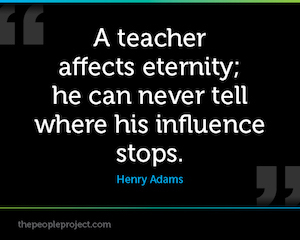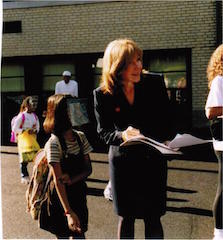The state of our public education system continues to captivate the minds and wallets of millions of Americans. Policy is shifting from the No Child Left Behind Act, to the Every Student Succeeds Act. Debates rage on about the value of curriculum standards like the Common Core and the school choice movement with charter schools at the forefront. And, there are an astounding 3.1 million teachers working in our public schools, and yet, in the face of this rich social-, economic-, and political- landscape, the voice of the teacher is often notably absent.
This week is National Teacher Appreciation Week.
This week is National Teacher Appreciation week and I thought there would be no better time than to bring in that voice from a teacher who has spent years working with students, administrators, and fellow teachers in order to achieve one monumental goal: to educate our children and prepare them for success outside of the classroom. As a retired educator with a broad range of teaching experiences, Nancy Maglione shares with us her tips for principals, teachers, and policy-makers.
Steve Mariotti: What roles have you played in the school system?
Nancy Maglione: I have had a variety of teaching and administrative positions that have required me to adjust my focus and responsibilities. I taught reading and math to small groups as a Compensatory Education teacher. I was a classroom teacher and a Reading Specialist. I was Coordinator of Basic Skills, English as a Second Language, and District Testing K-12. I held a position as Coordinator of Initiatives and was an Elementary School Principal.
I was working in different counties in New Jersey including Bergen, Passaic, Union and Morris, which exposed me to varying communities and approaches to educating children. Working in multiple counties also introduced me to many talented professionals who shared their knowledge and supported my efforts.
SM: What were the different areas you specialized in?
NM: As a teacher, I found improving students' reading skills to be a challenge. In that the ability to read well is paramount to success across the curriculum, I decided to pursue a Master's Degree in Reading. I then became a Reading Specialist and found that assisting teachers with instruction was having a positive impact on a large number of students. My desire to work more closely with teachers led me to pursue a Master's Degree in Administration.
SM: What tips do you have for teaching reading?
NM: It has been many years since I taught reading in the classroom and great strides have been made in this area. However, I found students were highly motivated when presented with reading material that was of interest to them. My students loved stories I wrote in which they were the main character.
Reading for meaning is another important skill. Stressing that the purpose of reading is to derive meaning from the author's message encourages students to read phrases rather than attempt to decode isolated words.
SM: What about the role of the principal?
NM: The principal's job is to build and maintain an outstanding teaching staff. In order to do this, a principal must first identify and hire the best. Vigilant searching, interviewing and observing of demonstration lessons are essential practices to employ for finding the best candidates.
Building an outstanding teaching staff also requires identifying and remediating areas of weakness. Teachers who are unable to improve in these areas, in spite of executed improvement plans, need to be removed from the profession. For those high performing teachers, recognition, praise and ongoing professional development should be generously given to foster continued excellence.
SM: What advice would you give a new principal?
NM: Principals are often faced with situations that require them to make difficult decisions. My advice is to always be an advocate for children. Decisions based on what is best for the students are the right ones.
The first day of school
SM: How can you tell if a teacher is effective or not?
NM: Teacher evaluation involves lesson observations that focus on the delivery of instructional strategies and techniques. Examination of planning documents and student performance are also useful tools for assessing instruction. In addition, I found frequent classroom drop-ins valuable for assessing classroom climate. Positive teacher-student interactions and a healthy physical and emotional environment create a climate that promotes student learning.
Nancy's Tips for New Teachers:
Recognize that you have a direct impact on future generations and perform accordingly. It is essential that you achieve and maintain excellence.Expect to work hard. Keep up with current best practices and continually plan and deliver instruction that addresses the needs of each student. This requires an enormous amount of time, energy and compassion.
Respect your students and model integrity and dedication. Your students will respect you and perform their best in return.
SM: Do you have any recommendations for the government for improving education?
NM: Most importantly, I would recommend that politicians demand that research supports the probable success of proposed programs. I also recommend that they require proof of positive results of existing programs before continuing to fund them. In addition, I would ask politicians to seriously consider increased funding for research and programs that target the following areas: Prenatal Care, Parenting Skills - Birth to Young Adult, Emotional Quotient, and Gifted and Talented Education.



